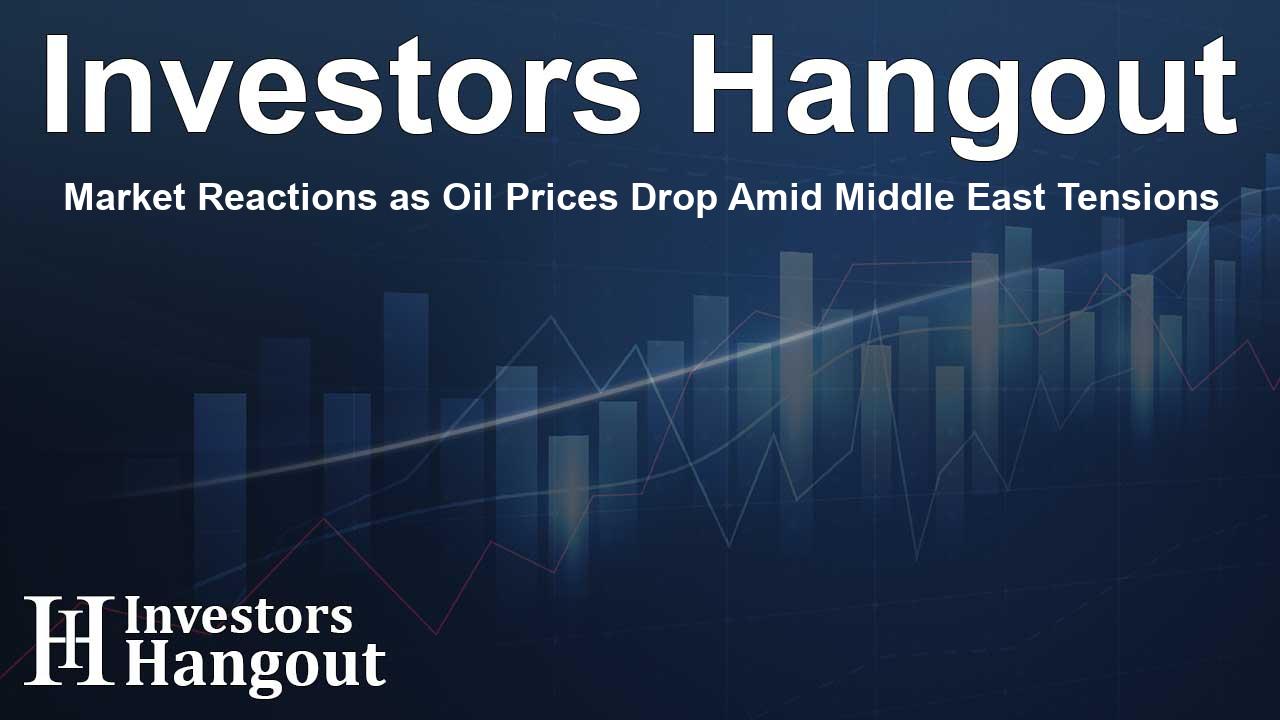Market Reactions as Oil Prices Drop Amid Middle East Tensions

Oil Prices React to Middle East Conflict Developments
Oil prices experienced a noticeable decline as the market reacted to the potential ceasefire between Israel and Hezbollah. The geopolitical landscape in the Middle East often has a significant impact on global oil prices, and the current situation is no exception.
Current Trends in Oil Futures
Brent crude futures fell by 28 cents, or 0.38%, reaching $72.73 per barrel. Meanwhile, U.S. West Texas Intermediate crude also experienced a dip, losing 32 cents, or 0.46%, to settle at $68.62 per barrel. These declines follow a considerable drop of $2 per barrel on a previous trading day, indicating a trend as investors adjust their strategies towards the news surrounding the conflict.
Market Analysis and Predictions
Analysts from ANZ have pointed out that a ceasefire in Lebanon could decrease the chances of stringent sanctions being imposed on Iranian crude oil by the incoming U.S. administration. Iran, a key supporter of Hezbollah, has a production capacity of approximately 3.2 million barrels per day, accounting for about 3% of the global oil supply.
The return of aggressive tactics towards Tehran could have significant ramifications, potentially leading to a reduction of Iranian exports by up to 1 million barrels per day. This would tighten an already delicate balance in global crude markets.
The Impact of Global Events on Oil Supply
As the conflict in the Middle East unfolds, other geopolitical events are also influencing oil prices. For instance, the ongoing tensions between Russia and Ukraine are creating additional strains. Recently, Ukraine's Mayor reported sustained drone attacks on Kyiv, escalating the conflict and bringing concerns about energy security to the forefront.
OPEC’s Stance and Future Considerations
The Organization of the Petroleum Exporting Countries (OPEC) and its allies may consider maintaining their current output cuts starting January 1. This decision comes amidst concerns about global demand, suggesting that OPEC+ is cautious about the potential oversupply caused by fluctuating geopolitical factors.
U.S. Trade Policies and Oil Imports
In the U.S., President-elect Donald Trump has indicated plans to implement a 25% tariff on imports from Canada and Mexico, though it remains uncertain if crude oil would be included in this policy. Canada is a significant player in the oil market, exporting around 4 million barrels per day, predominantly to U.S. markets. Given that the qualities of Canadian oil are distinct from U.S. production, industry analysts believe that tariffs on Canadian oil are unlikely due to the challenges of sourcing alternatives.
Future Implications for Oil Prices
As these geopolitical tensions and trade policies unfold, it’s increasingly clear that oil market volatility will continue. Investors are advised to stay vigilant and consider how middle eastern conflicts and U.S. trade policies might shape the price of oil in the weeks ahead.
Frequently Asked Questions
What are the latest trends in global oil prices?
Global oil prices are experiencing declines due to geopolitical tensions, particularly with the Israel-Hezbollah conflict influencing market perceptions of risk.
How does a ceasefire in the Middle East affect oil prices?
A ceasefire may lessen the risk of stringent sanctions on Iranian crude oil, which can stabilize prices but also increases market volatility.
What is the significance of OPEC’s decisions on oil output?
OPEC's decisions on oil output are crucial as they can either stabilize or destabilize the global oil market based on supply-demand dynamics.
Will U.S. tariffs on imports affect oil prices?
Potential tariffs on Canadian oil imports could disrupt supply chains, although analysts anticipate that oil exports might be exempt due to their unique characteristics.
What should investors be aware of regarding oil market fluctuations?
Investors should remain aware of geopolitical developments and trade policies, as these factors heavily influence oil prices and market forecasts.
About Investors Hangout
Investors Hangout is a leading online stock forum for financial discussion and learning, offering a wide range of free tools and resources. It draws in traders of all levels, who exchange market knowledge, investigate trading tactics, and keep an eye on industry developments in real time. Featuring financial articles, stock message boards, quotes, charts, company profiles, and live news updates. Through cooperative learning and a wealth of informational resources, it helps users from novices creating their first portfolios to experts honing their techniques. Join Investors Hangout today: https://investorshangout.com/
Disclaimer: The content of this article is solely for general informational purposes only; it does not represent legal, financial, or investment advice. Investors Hangout does not offer financial advice; the author is not a licensed financial advisor. Consult a qualified advisor before making any financial or investment decisions based on this article. The author's interpretation of publicly available data shapes the opinions presented here; as a result, they should not be taken as advice to purchase, sell, or hold any securities mentioned or any other investments. The author does not guarantee the accuracy, completeness, or timeliness of any material, providing it "as is." Information and market conditions may change; past performance is not indicative of future outcomes. If any of the material offered here is inaccurate, please contact us for corrections.